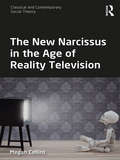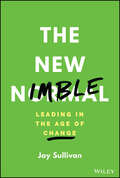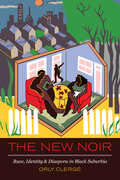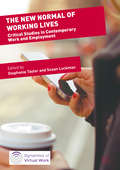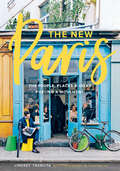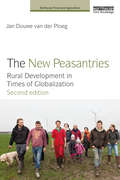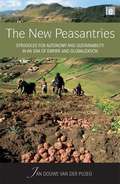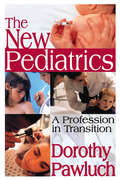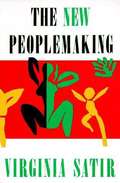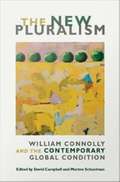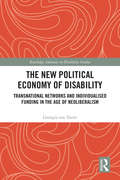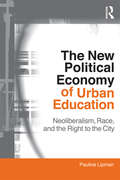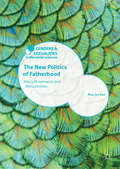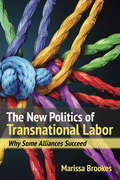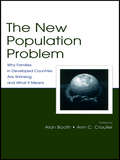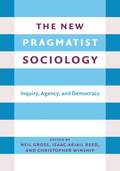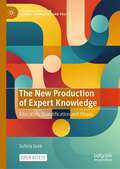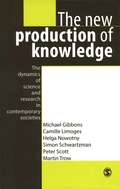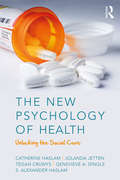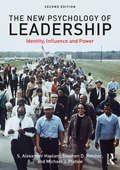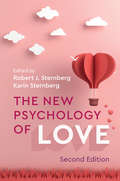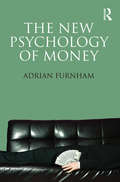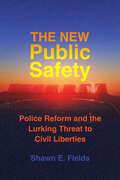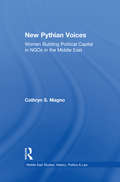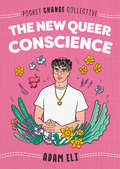- Table View
- List View
The New Narcissus in the Age of Reality Television: Losing Sight Of Ourselves (Classical and Contemporary Social Theory)
by Megan CollinsThis book explores the emergence and encouragement of the new narcissus in our society and the ways in which this is portrayed in reality television. Through studies of well-known reality shows, including Toddlers and Tiaras, Hoarders, Sister Wives, Catfish: The TV Show, Celebrity Rehab with Dr. Drew and The Real Housewives, the author examines the combined effects of narcissism and consumerism, shedding light on the ways in which people are pushed to focus on their own biographies and self-promotion to the point of creating a false self within the individual and the development of a sense of dissatisfaction, dis-ease and unhappiness. Applying Freud’s concept of narcissism and tracing it through the work of key social theorists including Durkheim, Lasch, Goffman, Riesman, Baudrillard and Giddens, The New Narcissus in the Age of Reality Television constitutes an insightful analysis of the modern ideology of greatness, perfection or ‘being the best’, that permeates society – an ideology that overwhelms and ultimately drives the individual to dissemble and project an artificial self. A compelling argument for the importance of understanding the persistence of a powerful and dangerous trait in modern society, this book will appeal to scholars of sociology, social theory and cultural and media studies with interests in reality television, celebrity culture and modern narcissism.
The New Nimble: Leading in the Age of Change
by Jay SullivanTransform your organization into an adaptable and flexible innovator In The New Nimble: Leading in the Age of Change, accomplished author, professor, and consultant Jay Sullivan delivers a clear, tangible, and actionable guide to implementing flexibility and creativity in your enterprise. Through interviews with senior leaders from a variety of industries and disciplines, the author shows you the trends and behaviors that allowed successful companies to navigate the constantly changing realities and complexities of the COVID-19 crisis. The book demonstrates how the most adaptable firms internalized and institutionalized lessons from the health emergency and applied those lessons to their everyday operations. You’ll discover: How to go beyond economic, business, and industry trends to make decisions based on immediately relevant—and rapidly changing—demands How to deal with pushback from staff, clients, and the public as you make the changes you need to make in your company Ways to apply the lessons from the COVID-19 crisis to the next unexpected and unpredictable emergencyAn essential and practical handbook for managers, executives, founders, directors, entrepreneurs, and other business leaders doing their best to manage their way through chaotic and volatile environments, The New Nimble is the hands-on leadership guide for a new world that we’ve all been waiting for.
The New Noir: Race, Identity, and Diaspora in Black Suburbia
by Orly ClergeThe expansion of the Black American middle class and the unprecedented increase in the number of Black immigrants since the 1960s have transformed the cultural landscape of New York. In The New Noir, Orly Clerge explores the richly complex worlds of an extraordinary generation of Black middle class adults who have migrated from different corners of the African diaspora to suburbia. The Black middle class today consists of diverse groups whose ongoing cultural, political, and material ties to the American South and Global South shape their cultural interactions at work, in their suburban neighborhoods, and at their kitchen tables. Clerge compellingly analyzes the making of a new multinational Black middle class and how they create a spectrum of Black identities that help them carve out places of their own in a changing 21st-century global city. Paying particular attention to the largest Black ethnic groups in the country, Black Americans, Jamaicans, and Haitians, Clerge’s ethnography draws on over 80 interviews with residents to examine the overlooked places where New York’s middle class resides in Queens and Long Island. This book reveals that region and nationality shape how the Black middle class negotiates the everyday politics of race and class.
The New Normal of Working Lives
by Stephanie Taylor Susan LuckmanThis critical, international and interdisciplinary edited collection investigates the new normal of work and employment, presenting research on the experience of the workers themselves. The collection explores the formation of contemporary worker subjects, and the privilege or disadvantage in play around gender, class, age and national location within the global workforce. Organised around the three areas of: creative working, digital working lives, and transitions and transformations, its fifteen chapters examine in detail the emerging norms of work and work activities in a range of occupations and locations. It also investigates the coping strategies adopted by workers to manage novel difficulties and life circumstances, and their understandings of the possibilities, trajectories, mobilities, identities and potential rewards of their work situations. This book will appeal to a wide range of audiences, including students and academics of the sociology of work and labor history, and those interested in understanding the implications of the 'new normal' of work and employment.
The New Paris: The People, Places & Ideas Fueling a Movement
by Lindsey Tramuta“[Tramuta] draws back the curtain on the city’s hipper, more happening side—as obsessed with coffee, creativity, and brunch as Brooklyn or Berlin.” —My Little ParisThe city long-adored for its medieval beauty, old-timey brasseries, and corner cafés has even more to offer today. In the last few years, a flood of new ideas and creative locals has infused a once-static, traditional city with a new open-minded sensibility and energy. Journalist Lindsey Tramuta offers detailed insight into the rapidly evolving worlds of food, wine, pastry, coffee, beer, fashion, and design in the delightful city of Paris. Tramuta puts the spotlight on the new trends and people that are making France’s capital a more whimsical, creative, vibrant, and curious place to explore than its classical reputation might suggest. With hundreds of striking photographs that capture this fresh, animated spirit—and a curated directory of Tramuta’s favorite places to eat, drink, stay, and shop—The New Paris shows us the storied City of Light as never before.“The author’s vibrant and precise command of English frames this lively collection of insights about cultural change and stories regarding multiple chefs and merchants.” —Forbes“As the culinary scene in Paris evolves, a new palate of flavors and styles of eating have emerged, redefining what is ‘French cuisine.’ The New Paris documents these changes through the lens of bakers, coffee roasters, ice cream makers, chefs, and even food truck owners. A thoughtful, and delicious, look at how Paris continues to delight and excite the palates of visitors and locals.” —David Lebovitz, author of My Paris Kitchen
The New Peasantries: Rural Development in Times of Globalization (Earthscan Food and Agriculture)
by Jan Douwe van der PloegWhen first published in 2008, The New Peasantries revolutionized our ways of thinking of what constitutes the peasantry and re-peasantization. It showed how a new era of empire and globalization was creating new forms of peasantry. This new edition is thoroughly revised, with a reorganization of chapters and several new chapters added. It includes a new chapter on China, based on the author's extensive fieldwork there, and much more information on Brazil. It integrates and critically reviews the many publications on peasants, peasantries and peasant modes of agricultural production published in recent years. The theoretical discussion is enriched with more attention to the seminal work of Chayanov. Greater attention is also paid to the construction of new markets – a theme that will remain a major issue in the coming decade. It combines and integrates different bodies of literature: the rich traditions of peasant studies, development and rural sociology, neo-institutional economics and debates on empire and globalization. The original book has been used in several international postgraduate courses. The experience and feedback thus obtained has been used to simplify the structure of the book and make it more accessible as a textbook for students.
The New Peasantries: Struggles for Autonomy and Sustainability in an Era of Empire and Globalization
by Jan Douwe van der PloegThis book explores the position, role and significance of the peasantry in an era of globalization, particularly of the agrarian markets and food industries. It argues that the peasant condition is characterized by a struggle for autonomy that finds expression in the creation and development of a self-governed resource base and associated forms of sustainable development. In this respect the peasant mode of farming fundamentally differs from entrepreneurial and corporate ways of farming. The author demonstrates that the peasantries are far from waning. Instead, both industrialized and developing countries are witnessing complex and richly chequered processes of 're-peasantization', with peasants now numbering over a billion worldwide. The author's arguments are based on three longitudinal studies (in Peru, Italy and The Netherlands) that span 30 years and provide original and thought-provoking insights into rural and agrarian development processes. The book combines and integrates different bodies of literature: the rich traditions of peasant studies, development sociology, rural sociology, neo-institutional economics and the recently emerging debates on Empire.
The New Pediatrics: A Profession in Transition
by Dorothy PawluchWhen antibiotics became readily available in the 1950s, the danger of life-threatening infectious childhood diseases virtually disappeared. In that era, pediatricians broadened the core professional task of their specialty--the prevention and treatment of such diseases--to incorporate the behavioral and psychosocial problems of children and adolescents. Pediatricians themselves began to refer to this changing emphasis as the "new pediatrics," and to see the trend as a natural progression of their specialty into new areas of care. At the same time there arose widespread disaffection among practicing general pediatricians, defection to other areas of practice, and a decline in the popularity of pediatrics as a specialty choice.In analyzing the emergence of the new pediatrics as a case study within medical sociology, Pawluch shows how professional concerns and interests infl uence debate around social problems. As sociologists began to take greater interest in the problems of childhood, and as children's lives became increasingly medicalized--as some have argued--it is at least in part because of pediatricians' willingness to endorse medical defi nitions for certain social problems and to provide treatment for them.Pawluch's underlying concern is that medical professionals have begun to make claims for authority in the definition of what constitutes the social problems of childhood. Among the topics she examines are the "dissatisfied pediatrician syndrome," the potential for a crisis in oversupply of pediatricians and competing providers of services, the push for expansion into new areas of care, and possible future developments in this specialty.
The New Peoplemaking
by Virginia SatirThe New Peoplemaking expresses Satir's most evolved thoughts on self-worth, communication, family systems, and the ways in which people relate to one another. Drawn on Satir's lifetime of experience with thousands of families around the world, it is written in the engaging style for which she is famous. The New Peoplemaking is completely revised from the 1972 edition and enlarged by six new chapters that elaborate on the whole of life.
The New Pluralism: William Connolly and the Contemporary Global Condition
by David Campbell Morton SchoolmanWilliam Connolly, one of the best-known and most important political theorists writing today, is a principal architect of the "new pluralism. " In this volume, leading thinkers in contemporary political theory and international relations provide a comprehensive investigation of the new pluralism, Connolly's contributions to it, and its influence on the fields of political theory and international relations. Together they trace the evolution of Connolly's ideas, illuminating his challenges to the "old," conventional pluralist theory that dominated American and British political science and sociology in the second half of the twentieth century. The contributors show how Connolly has continually revised his ideas about pluralism to take into account radical changes in global politics, incorporate new theories of cognition, and reflect on the centrality of religion in political conflict. They engage his arguments for an agonistic democracy in which all fundamentalisms become the objects of politicization, so that differences are not just tolerated but are productive of debate and the creative source of a politics of becoming. They also explore the implications of his work, often challenging his views to widen the reach of even his most recently developed theories. Connolly's new pluralism will provoke all citizens who refuse to subordinate their thinking to the regimes in which they reside, to religious authorities tied to the state, or to corporate interests tied to either. The New Pluralism concludes with an interview with Connolly in which he reflects on the evolution of his ideas and expands on his current work. Contributors: Roland Bleiker, Wendy Brown, David Campbell, William Connolly, James Der Derian, Thomas L. Dumm, Kathy E. Ferguson, Bonnie Honig, George Kateb, Morton Schoolman Michael J. Shapiro, Stephen K. White
The New Political Economy of Disability: Transnational Networks and Individualised Funding in the Age of Neoliberalism (Routledge Advances in Disability Studies)
by Georgia van ToornThis book addresses the ways in which individualised, market-based models of disability support provision have been mobilised in and across different countries through cross-national investigation of individualised funding (IF) as an object of neoliberal policy mobility. Combining rich theoretical and interdisciplinary perspectives with extensive empirical research, the book provides a timely examination of the policy processes and mechanisms driving the spread of IF amongst countries at the forefront of disability policy reform. It is argued that IF’s mobility is not attributable to neoliberalism alone, but to the complex intersections between neoliberal and emancipatory agendas, and to the transnational networks that have blended the two agendas in new ways in different institutional contexts. The book shows how disability rights struggles have synchronised with neoliberal agendas, which explains IF’s propensity to move and mutate between different jurisdictions. Featuring first-hand accounts of the activists and advocates engaged in these struggles, the book illuminates the consequences and risks of the dangerous liaisons and political trade-offs that seemed necessary to get individualised funding on the policy agenda for disabled people. It will be of interest to all scholars and students working in disability studies, social policy, sociology and political science more generally.
The New Political Economy of Urban Education: Neoliberalism, Race, and the Right to the City (Critical Social Thought)
by Pauline LipmanUrban education and its contexts have changed in powerful ways. Old paradigms are being eclipsed by global forces of privatization and markets and new articulations of race, class, and urban space. These factors and more set the stage for Pauline Lipman's insightful analysis of the relationship between education policy and the neoliberal economic, political, and ideological processes that are reshaping cities in the United States and around the globe. Using Chicago as a case study of the interconnectedness of neoliberal urban policies on housing, economic development, race, and education, Lipman explores larger implications for equity, justice, and "the right to the city". She draws on scholarship in critical geography, urban sociology and anthropology, education policy, and critical analyses of race. Her synthesis of these lenses gives added weight to her critical appraisal and hope for the future, offering a significant contribution to current arguments about urban schooling and how we think about relations between neoliberal education reforms and the transformation of cities. By examining the cultural politics of why and how these relationships resonate with people's lived experience, Lipman pushes the analysis one step further toward a new educational and social paradigm rooted in radical political and economic democracy.
The New Politics of Fatherhood: Men's Movements and Masculinities (Genders and Sexualities in the Social Sciences)
by Ana JordanThis book makes a unique contribution to contemporary research into masculinities, men’s movements, and fathers’ rights groups. It examines the role of changing masculinities in creating equality and/or reinforcing inequality by analysing diverse men’s movements, their politics, and the identities they (re)construct. Jordan advances a typology for categorising men’s movements (‘feminist', ‘postfeminist', and ‘backlash’ movements) and addresses debates over the construction of ‘masculinity-in-crisis’, arguing that ‘crisis’ is frequently invoked in problematic ways. These themes are further explored through original analyses of material produced by ‘feminist’, ‘postfeminist’, and ‘backlash’ men’s groups. The main empirical contribution of the book draws on interviews with fathers’ rights activists to explore the (gendered) implications of the ‘new’ politics of fatherhood. The nuanced examination of fathers’ rights perspectives reveals multiple, complex narratives of masculinity, fatherhood, and gender politics. The cumulative effect of these is, at best, postfeminist and depoliticising, and, at worst, another vitriolic ‘backlash’.The New Politics of Fatherhood expands scholarly understandings of gender, masculinities, and social movements in the under-researched UK context, and will appeal to readers with interests in these areas.
The New Politics of Transnational Labor: Why Some Alliances Succeed
by Marissa BrookesOver the years many transnational labor alliances have succeeded in improving conditions for workers, but many more have not. In The New Politics of Transnational Labor, Marissa Brookes explains why this dichotomy has occurred. Using the coordination and context-appropriate (CCAP) theory, she assesses this divergence, arguing that the success of transnational alliances hinges not only on effective coordination across borders and within workers' local organizations but also on their ability to exploit vulnerabilities in global value chains, invoke national and international institutions, and mobilize networks of stakeholders in ways that threaten employers' core, material interests.Brookes uses six comparative case studies spanning four industries, five countries, and fifteen years. From dockside labor disputes in Britain and Australia to service sector campaigns in the supermarket and private security industries to campaigns aimed at luxury hotels in Southeast Asia, Brookes creates her new theoretical framework and speaks to debates in international and comparative political economy on the politics of economic globalization, the viability of private governance, and the impact of organized labor on economic inequality. From this assessment, Brookes provides a vital update to the international relations literature on non-state actors and transnational activism and shows how we can understand the unique capacities labor has as a transnational actor.
The New Population Problem: Why Families in Developed Countries Are Shrinking and What It Means (Penn State University Family Issues Symposia Series)
by Alan Booth Ann C. CrouterThis book is based on the presentations and discussions from a national symposium on "Creating the Next Generation: Social, Economic, and Psychological Processes Underlying Fertility in Developed Countries," held at the Pennsylvania State University in 2003. The papers address some of the antecedents and consequences of the recent steep declines in fertility in developed countries from different theoretical and disciplinary angles. While fertility rates are still high in some less-developed parts of the world, the new population problem with many countries in Europe, Asia, and North America is declining fertility. With fertility decline comes a reshaping of the population pyramid. The topic of fertility decline is interesting not only at the level of the individuals and couples, but also at the level of the societies that must come to grips with their long-term implications.Divided into four Parts, the text:*looks at contemporary trends in U.S. fertility, thus setting the stage for the entire volume;*discusses social and cultural values and attitudes;*analyzes fertility decisions in different countries; and*focuses on the possible long-term consequences of current fertility trends for individuals, families, and societies.
The New Pragmatist Sociology: Inquiry, Agency, and Democracy
by John Levi Martin Ann Mische Stefan Timmermans Iddo Tavory Paul Lichterman Jeffrey Parker Daniel Silver Mario Small Daniel Huebner Luis Flores Josh Whitford Mazen Elfakhani Cayce Hughes Vontrese Pamphile Natalie B. Aviles Susan Silbey Karida Brown Luna Vincent Daniel CefaiPragmatist thought is central to sociology. However, sociologists typically encounter pragmatism indirectly, as a philosophy of science or as an influence on canonical social scientists, rather than as a vital source of theory, research questions, and methodological reflection in sociology today.In The New Pragmatist Sociology, Neil Gross, Isaac Ariail Reed, and Christopher Winship assemble a range of sociologists to address essential ideas in the field and their historical and theoretical connection to classical pragmatism. The book examines questions of methodology, social interaction, and politics across the broad themes of inquiry, agency, and democracy. Essays engage widely and deeply with topics that motivate both pragmatist philosophy and sociology, including rationality, speech, truth, expertise, and methodological pluralism.Contributors include Natalie Aviles, Karida Brown, Daniel Cefaï, Mazen Elfakhani, Luis Flores, Daniel Huebner, Cayce C. Hughes, Paul Lichterman, John Levi Martin, Ann Mische, Vontrese D. Pamphile, Jeffrey N. Parker, Susan Sibley, Daniel Silver, Mario Small, Iddo Tavory, Stefan Timmermans, Luna White, and Joshua Whitford.
The New Production of Expert Knowledge: Education, Quantification and Utopia (Palgrave Studies in Science, Knowledge and Policy)
by Sotiria GrekThis Open Access book offers a novel perspective on the role of quantification in the making of education utopias through an analysis of expert knowledge and its producers. Drawing on empirical findings from the European Research Council funded project ‘International Organisations and the Rise of a Global Metrological Field’ (METRO, 2017-2022), Education, Quantification and Utopia focuses on the ways that metrological realism has constructed a well-supported epistemic infrastructure, built on relationships and practices that go beyond the mere objectivity and reliability of numerical evidence. The book’s chapters outline how the production of new forms of education expertise have led to ideational and institutional interdependencies, and ultimately the making of an intricate, fragmented and opaque knowledge and governance web.
The New Production of Knowledge: The Dynamics of Science and Research in Contemporary Societies
by Helga Nowotny Peter Scott Simon Schwartzman Martin Trow Michael Gibbons Camille LimogesIn this provocative and broad-ranging work, the authors argue that the ways in which knowledge - scientific, social and cultural - is produced are undergoing fundamental changes at the end of the twentieth century. They claim that these changes mark a distinct shift into a new mode of knowledge production which is replacing or reforming established institutions, disciplines, practices and policies. Identifying features of the new mode of knowledge production - reflexivity, transdisciplinarity, heterogeneity - the authors show how these features connect with the changing role of knowledge in social relations. While the knowledge produced by research and development in science and technology is accorded central concern, the authors also outline the changing dimensions of social scientific and humanities knowledge and the relations between the production of knowledge and its dissemination through education.
The New Psychology of Health: Unlocking the Social Cure
by Jolanda Jetten Alex Haslam Catherine Haslam Tegan Cruwys Genevieve DingleWhy do people who are more socially connected live longer and have better health than those who are socially isolated? Why are social ties at least as good for your health as not smoking, having a good diet, and taking regular exercise? Why is treatment more effective when there is an alliance between therapist and client? Until now, researchers and practitioners have lacked a strong theoretical foundation for answering such questions. This ground-breaking book fills this gap by showing how social identity processes are key to understanding and effectively managing a broad range of health-related problems. Integrating a wealth of evidence that the authors and colleagues around the world have built up over the last decade, The New Psychology of Health provides a powerful framework for reconceptualising the psychological dimensions of a range of conditions – including stress, trauma, ageing, depression, addiction, eating behaviour, brain injury, and pain. Alongside reviews of current approaches to these various issues, each chapter provides an in-depth analysis of the ways in which theory and practice can be enriched by attention to social identity processes. Here the authors show not only how an array of social and structural factors shape health outcomes through their impact on group life, but also how this analysis can be harnessed to promote the delivery of ‘social cures’ in a range of fields. This is a must-have volume for service providers, practitioners, students, and researchers working in a wide range of disciplines and fields, and will also be essential reading for anyone whose goal it is to improve the health and well-being of people and communities in their care.
The New Psychology of Leadership: Identity, Influence and Power
by S. Alexander Haslam Michael J. Platow Stephen D. ReicherThis ground-breaking book provides a refreshing introduction to the field of leadership and is jam-packed with theoretical and practical insights derived from a wealth of applied scientific research conducted by the authors and their colleagues around the world over the last three decades. It starts from the premise that leadership is never just about leaders. Instead it is about leaders and followers who are joined together as members of a social group that provides them with a sense of shared social identity — a sense of ‘us-ness’. In these terms, leadership is understood as the process through which leaders work with followers to create, represent, advance, and embed this sense of shared social identity. The new edition of this award-winning book presents a wealth of evidence from historical, organizational, political and sporting contexts to provide an expanded exploration of these processes of identity leadership in action. In particular, it builds upon the success of the first edition by examining the operation of identity leadership in contemporary society and fleshing out practical answers to key organizational and institutional challenges. Drawing on real-world examples and rich data sources, this book will appeal to academics, researchers and students of psychology, business and management, as well as to practitioners, policy makers and anyone interested in the workings of leadership, influence and power.
The New Psychology of Love
by Robert J. Sternberg Karin SternbergThis is a much-needed development from the first edition that provides an update on the theory and research on love by world-renowned scientific experts. It explores love from a diverse range of standpoints: social-psychological, evolutionary, neuropsychological, clinical, cultural, and even political. It considers questions such as: how men and women differ in their love, what makes us susceptible to jealousy and envy in relationships, how love differs across various cultures? As the neuropsychological basis of love is examined, this study showcases what attracts people to one another, why love has developed the way it has over time, and what evolutionary purpose it serves. It also analyses why and when love relationships both succeed and fail, which means readers will be rewarded with a better understanding of their own relationships and those of others, as well as what can be done to build a lasting, loving relationship.
The New Psychology of Money
by Adrian FurnhamThe New Psychology of Money is an accessible and engrossing analysis of our psychological relationship to money in all its forms. Comprehensive and insightful, Adrian Furnham explores the role that money plays in a range of contexts, from the family to the high street, and asks whether the relationship is always a healthy one. Discussing how money influences what we think, what we say, and how we behave in a range of situations, the book places the dynamics of high finance and credit card culture in context with traditional attitudes towards wealth across a range of cultures, as well as how the concept of money has developed historically. The book is split into four sections: Understanding Money. What are our attitudes to money, and how does nationality, history and religion mediate those attitudes? Money in the Home How do we grow up with money, and what role does it play within the family? What role does gender play, and can we lose control in dealing with money? Money at Work. Are we really motivated by money at work? And what methods do retailers use to persuade us to part with our money? Money in Everyday Life. How do we balance the need to create more money for ourselves through investments with the desire to make charitable contributions, or give money to friends and family? How has the e-revolution changed our relationship to money? Radically updated from its original publication in 1998, The New Psychology of Money is a timely and fascinating book on the psychological impact of an aspect of daily life we generally take for granted. It will be of interest to all students of psychology, economics and business and management, but also anyone who takes an interest in the world around them.
The New Public Safety: Police Reform and the Lurking Threat to Civil Liberties
by Shawn E. FieldsEfforts to reduce reliance on police have gained momentum since 2020, driven by a growing recognition that public safety is better served when addressed by experts in medicine, mental health, houselessness, and behavior intervention. But this rush to reimagine public safety carries a serious risk: a long history of abuse exists within social welfare systems, and the laws protecting us from police who perpetrate these types of abuses largely do not apply to EMTs, social workers, and other nonpolice responders. While commending efforts to remove police from places they do not belong, The New Public Safety: Police Reform and the Lurking Threat to Civil Liberties raises the alarm on the dangers these reforms can pose if undertaken without proper restraints and protections and offers practical, achievable solutions to address these threats.
The New Pythian Voices: Women Building Capital in NGO's in the Middle East
by Cathryn MagnoFirst published in 2002. Routledge is an imprint of Taylor & Francis, an informa company.
The New Queer Conscience (Pocket Change Collective)
by Adam EliIn The New Queer Conscience, LGBTQIA+ activist Adam Eli argues the urgent need for queer responsibility -- that queers anywhere are responsible for queers everywhere. <p><p> Pocket Change Collective is a series of small books with big ideas from today's leading activists and artists. In this installment, The New Queer Conscience, Voices4 Founder and LGBTQIA+ activist Adam Eli offers a candid and compassionate introduction to queer responsibility. Eli calls on his Jewish faith to underline how kindness and support within the queer community can lead to a stronger global consciousness. More importantly, he reassures us that we're not alone. In fact, we never were. Because if you mess with one queer, you mess with us all.
